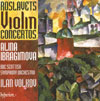Roslavets Violin Concertos Nos 1 & 2
Played like a dream – don’t miss this if you’re into rare 20th-century gems
View record and artist detailsRecord and Artist Details
Composer or Director: Nikolay Andreyevich Roslavets
Genre:
Orchestral
Label: Hyperion
Magazine Review Date: 1/2009
Media Format: CD or Download
Media Runtime: 58
Mastering:
Stereo
DDD
Catalogue Number: CDA67637

Tracks:
| Composition | Artist Credit |
|---|---|
| Concerto for Violin and Orchestra No 1 |
Nikolay Andreyevich Roslavets, Composer
Alina Ibragimova, Violin BBC Scottish Symphony Orchestra Ilan Volkov, Conductor Nikolay Andreyevich Roslavets, Composer |
| Concerto for Violin and Orchestra No 2 |
Nikolay Andreyevich Roslavets, Composer
Alina Ibragimova, Violin BBC Scottish Symphony Orchestra Ilan Volkov, Conductor Nikolay Andreyevich Roslavets, Composer |
Author: Guy Rickards
The Second Concerto dates from 1936, during Roslavets’s rehabilitation after returning from exile in Tashkent (1930-33). The score came to light only recently and this is its first performance. As with the Second Chamber Symphony (12/06), the Second Concerto’s three movements are written in a less complex idiom than Roslavets had used in the 1920s and include folk-like turns of phrase that may have been intended to make it more palatable in the dangerous times of the Stalinist terror. A much slighter prospect than its predecessor (only the first movement is built on the same scale), it nevertheless proves a most enjoyable work. Ibragimova once more plays like a dream, and Volkov and the BBC Scottish SO accompany superbly throughout. Simon Eadon’s sound is first-rate. Anyone interested in rare 20th-century repertoire need not hesitate.
Discover the world's largest classical music catalogue with Presto Music.

Gramophone Digital Club
- Digital Edition
- Digital Archive
- Reviews Database
- Full website access
From £8.75 / month
Subscribe
Gramophone Full Club
- Print Edition
- Digital Edition
- Digital Archive
- Reviews Database
- Full website access
From £11.00 / month
Subscribe
If you are a library, university or other organisation that would be interested in an institutional subscription to Gramophone please click here for further information.




